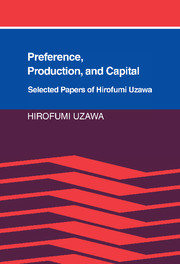Foreword
Published online by Cambridge University Press: 04 May 2010
Summary
In 1954 or thereabouts, I received in the mail a letter and a manuscript from Japan. The letter came from a young man, Hirofumi Uzawa, who identified himself as a graduate student in mathematics at the University of Tokyo. The manuscript referred to an unpublished paper by Leonid Hurwicz and myself, distributed as a RAND Corporation paper, which proposed what amounted to an iterative method of solving concave programs based on a partial analogy to the competitive market. We had only been able to show that the method was locally stable; if the starting point was sufficiently close to the optimum, the method would indeed converge to it. Uzawa's manuscript showed elegantly and simply that the Euclidean distance to the optimum was bound to be decreasing and therefore our process must converge globally. The letter stated with characteristic modesty that undoubtedly the author's paper contained errors, and he would be grateful to have them pointed out. Of course, there were no errors. I immediately looked over what small research budget I then had from the Office of Naval Research and found enough to invite him to spend the next year at Stanford. How fortunate to have had the opportunity of making such a good decision even once in a lifetime.
Uzawa promptly took a leading role in the development of economic theory. His earliest work took off from current topics, such as concave programming and the existence and stability of competitive equilibrium.
- Type
- Chapter
- Information
- Preference, Production and CapitalSelected Papers of Hirofumi Uzawa, pp. xi - xiiPublisher: Cambridge University PressPrint publication year: 1989



